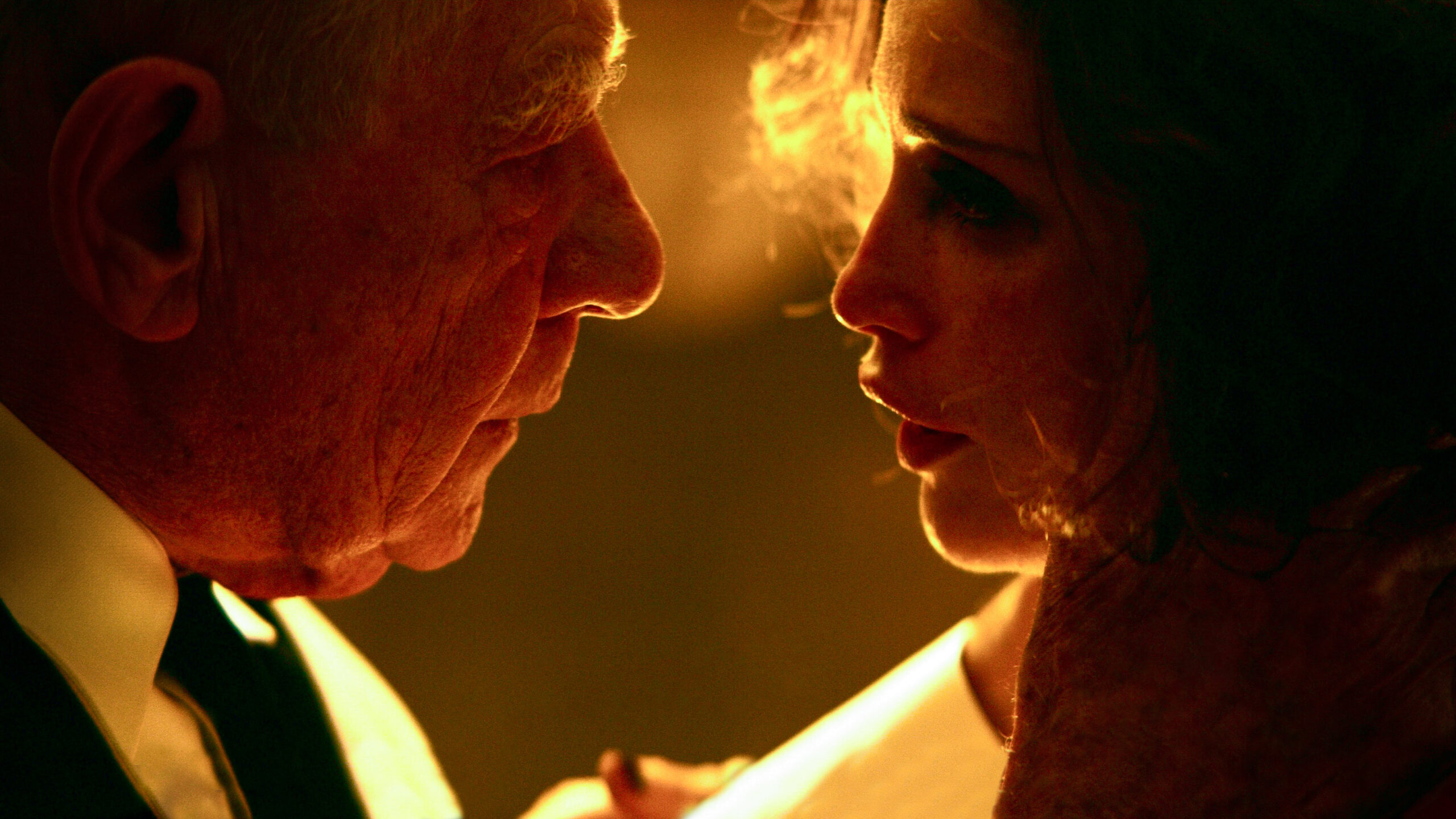The Critic
The Critic, 2024, 2 ½ stars
Non-critical
Ian McKellen mystery-drama is intriguing but flawed

Ian McKellen and Gemma Arterton star in The Critic. (Images are copyright and courtesy of Sony Pictures / BK Studios / Culminations Productions.)
Exclusive to MeierMovies, September 9, 2024
Theatre critic Jimmy Erskine’s pen is deadlier than his sword. But for the crusty old journalist, there’s something even deadlier than ink: blackmail.
Erskine has been a literary institution at The Daily Chronicle for 40 years. Known more for his scathing wit and William F. Buckley-like command of the English language than his respect for actors or his audience, he is stubbornness personified.
“I doubt our readers are familiar with the word,” a copy editor tells him upon encountering an archaism in his review. Erskine’s retort: “I doubt our readers can read.”
But when a scandal involving his Black male secretary and lover – because that was common in London in 1934 – threatens to end his career, he abandons the safe confines of the Fourth Estate and makes his own news by hatching a plot to blackmail his editor and thereby retain his job. Remember that critic in Birdman? The one who promised to “kill” Riggan Thomson’s play before even having seen it? She’s Mother Theresa next to Erskine.
The Critic is directed by Anand Tucker and written by Patrick Marber. Tucker has directed about a dozen films but is perhaps better known as the producer of Girl with a Pearl Earring and a handful of other movies, while Marber is famous for penning the Oscar-nominated script for Notes on a Scandal, from 2006. He based his script for The Critic on the 2015 novel Curtain Call by British author Anthony Quinn. But while the tale has all the twists and turns of an Agatha Christie story, the finished product has little of the Christie whimsy and intrigue. What it does have is a predictably delicious performance by Ian McKellen in the title role; competent support from Gemma Arterton as Nina Land, an up-and-coming actress caught in Erskine’s evil web; and a great turn by Mark Strong, who, as David Brooke, Erskine’s boss and blackmail target, projects a relatability and sweetness that the rest of the film lacks.
Erskine, in contrast, is mean, unsympathetic and ultimately just not that interesting. These characteristics apparently bothered test audiences so much that the filmmakers reworked the movie. I loathe test audiences and would have liked to see the original, especially because this final version still suffers from the unrelatability of the title character.
The film starts with a memorable monologue from McKellan about the purpose of a critic but then mostly abandons its theatrical focus. Indeed, Erskine could be any person, from a lawyer to a janitor, who will do anything to keep his job. His brand of evil isn’t unique to the world of the stage, or the media.
“Truth is imperative” for a great critic, Erskine says in the aforementioned speech. But he then spends the rest of the film cloaking himself in deception. So much for journalistic integrity.
This criticism would be mostly pointless, however, if the film were more carefully crafted. Alternatingly and frustratingly briefly, it wants to be about Erskine’s ego, Nina’s career, Nina’s relationship with her mother (Lesley Manville), Nina’s affair with a married man, that married man’s faltering marriage, the life of Erskine’s lover (Alfred Enoch), Brooke’s family and career (after taking over the paper from his recently deceased father) and Brooke’s philandering with Nina. In the end, it’s not about much of anything at all, except perhaps a contrived, anachronistic statement regarding LGBTQ rights, or lack thereof, in 1930s Britain, when homosexuality was illegal.
This is the point in the review when Erskine would rip the film to shreds, roasting the cast and crew mercilessly. But the truth is that there’s almost as much to like (performance, pacing, mood and twists) about The Critic as to dislike. While that might make for a boring article – or at least one less entertaining than the typical Erskine composition – it makes for a fairer, more balanced one. And, ultimately, that is what Erskine’s reviews, and the film itself, lack: balance and focus.
The best critics cut through the bullshit. So let’s do that. Are critics really needed? Probably not, unless they are that rare breed who create a unique piece of new art from the art they are reviewing and thereby allow audiences to see that original art in a new light. If they can’t do that, what’s the point of telling another person what to think? It’s unnecessary. And so are films about critics – at least this one.
© 2024 MeierMovies, LLC
For more information about this movie, visit IMDB and Wikipedia. It will receive a general release in cinemas on September 13, 2024.
